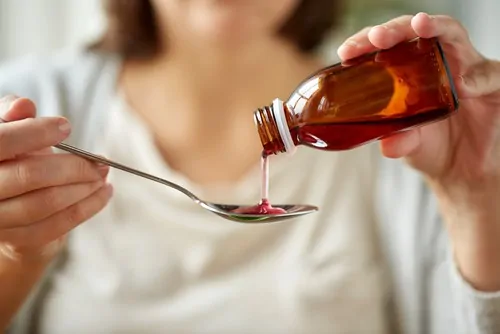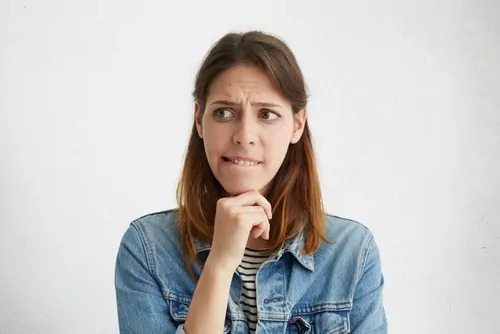The Oral Health Dangers of Cough Medicine

During this time of the year, it seems as if everyone we encounter is sneezing, sniffling, or coughing. While we do as much as we can to avoid getting a cold, sometimes we just get sick. When we do get a case of the coughs we just want it to go away, so we will try almost anything to make it stop. Most commonly, we’ll suck on cough drops and take cough syrup throughout the day. Even though these medications can alleviate our symptoms, your dentist in Douglasville wants you to know that the common ingredients in cough medicine do pose risks to oral health.
Concerning Ingredients
Many cough syrups and cough drops contain ingredients that can cause damage to teeth. More specifically, those medications containing sucrose, high fructose corn syrup, citric acid, and alcohol are the most concerning to your Douglasville dentist. The truth is, these ingredients can make us feel better during the course of a cold but can have long-term negative side effects on oral health.
Sugars
We’ve all heard Mary Poppins sing about how a spoonful of sugar will help the medicine go down, and she was right. Most cough syrups and cough drops contain sugar to help mask their naturally bad and bitter taste. But just like sugary snacks and foods, these sugars can be dangerous to teeth. When we introduce sugars into our mouths we can essentially create a feeding frenzy for bacteria. These bacteria will feed on sugar and then release an acidic byproduct. This acid will wear away tooth enamel and increases the risk of decay and cavities.
Alcohol
Besides sugar, some cold medicines contain small amounts of alcohol. Alcohol is known to cause dry mouth, even in smaller quantities. Normally, our mouths produce a lot of saliva — between 0.5 and 1.5 liters every day. This saliva helps neutralize dangerous acids and reduce the number of bacteria in the mouth. However, when alcohol causes dry mouth, saliva production slows and acids and bacteria stick around. This can increase the likelihood of decay.
Feel Better While Protecting Teeth
Even though cold medicine can increase the risk of tooth decay and cavities, you shouldn’t suffer through a cold by not taking it. However, your dentist in Douglasville my recommend:
- Taking a pill instead of liquid medication. Liquid medication can basically coat your mouth with sugar and alcohol, while pills greatly reduce how much contact your mouth has with those ingredients.
- Taking cold medication with food. When we eat we tend to produce more saliva which, as we know, will help wash away sugar and alcohol before they have a chance to cause damage.
- Brushing your teeth after you take medicine, especially before bed. Taking medicine then brushing your teeth will help reduce the amount of sugar and alcohol left in the mouth. This is particularly important before bed. Taking cough syrup before bed without brushing your teeth after means the ingredients are lingering in the mouth all night long.
While we truly hope our patients and neighbors stay healthy all year round if you do happen to get sick, try taking medicine using the tips above to protect your smile.
Why Do I Bite My Lips, Cheeks, and Tongue?

Biting your lips, cheeks, or tongue is a common habit for many people. While it may seem relatively harmless, biting the soft tissues in our mouths can lead to serious and painful problems. But like any habit, it can be difficult to stop biting your lips, cheeks, or tongue. Join your Douglasville dentist as we share a bit about why biting is bad and what you can do to break the habit.
Why We Bite
There are several possible explanations behind why we bite our lips, cheeks, or tongue. Occasionally, stress or nerves can be to blame. If you’re someone who chronically bites, this is most likely the case. But there are things you can try to help you stop. First, try to become more aware of when you bite. Maybe it’s during times of high stress or perhaps when you’re concentrating really hard. Once you know when you’re more likely to bite, you can start to work on consciously recognizing it and stopping it.
Other times, biting a lip, cheek, or tongue is purely accidental and can happen while we’re chewing or even during a sneeze. Even though these accidental bites can be painful and may even bleed, they’re usually not something to be concerned about and should heal on their own. However, there are some people who seem to bite their lip, cheek, or tongue accidentally a lot. If this is the case, it could be a sign of something a bit more serious such as a bad bite or TMJ disorder. Both of these dental concerns can mean that your top teeth don’t line up properly with your bottom teeth which makes it really easy for an accidental chomp to your cheek, lip, or tongue to occur. Your dentist in Douglasville will be able to help you determine if this is the case for you.
Why is Biting Bad?
First and foremost, biting the soft tissues of the mouth hurts, and the pain can last for a few days after the initial bite due to the sore that pops up as a result of the trauma. These sores that develop after a bite can become infected if they aren’t cleaned. Additionally, chronic biters can suffer from inflammation, swelling, pain, and redness. But that’s not all. If a bad bite or TMJ disorder is playing a role in your biting, you may also experience the common symptoms that accompany those problems including headaches and jaw pain.
How Do You Stop Biting?
Treatment of lip, cheek, or tongue biting depends on what’s causing it in the first place. If biting is a nervous habit, try to work with yourself to consciously stop it. More severe cases can benefit from behavioral therapy. If you suspect that your chronic accidental biting is because of a bad bite, schedule an appointment with your dentist in Douglasville. Your dental team is trained to help identify a bad bite and can suggest the most appropriate treatment for your specific case so you can stop biting once and for all.



